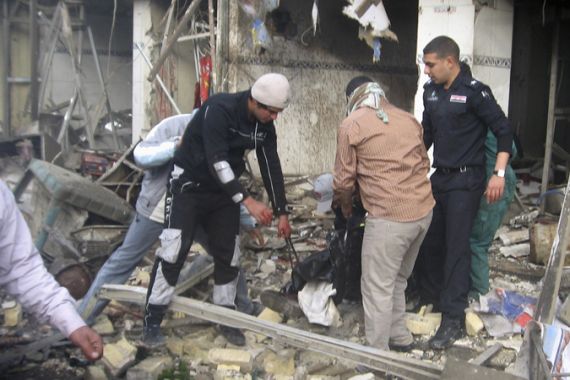Attacks on Iraq’s Shias leave scores dead
At least 70 killed in bombings that may enflame sectarian fears and further complicate ongoing political crisis.

BAGHDAD, Iraq – Iraq has been struck by a wave of bombings that killed more than 70 people, wounded at least 146 others, and has further deepened the country’s sectarian divide at a time of ongoing crisis in government.
Keep reading
list of 4 itemsDoes Israel’s Netanyahu have a plan for a ‘day after’ the war on Gaza?
Why Egypt backed South Africa’s genocide case against Israel in the ICJ
US sanctions two RSF commanders as fighting escalates in Sudan’s Darfur
The co-ordinated attacks on Thursday targeted Shia Muslims and their communities, leading to an atmosphere of fear that recalls the bloody sectarian war from 2006 to 2007, and only looks to worsen in days to come.
| More from Iraq | |||||||||||
| |||||||||||
In the morning, a bomb planted on a parked motorcycle and another two roadside devices killed at least nine people and wounded 35 others in the impoverished Sadr City district in northeastern Baghdad, sources said.
“There was a group of day labourers gathered, waiting to be hired for work. Someone brought his small motorcycle and parked it nearby. A few minutes later it blew up, killed some people, wounded others and burned some cars,” said a police officer at the scene who declined to be named.
Two bomb attacks in Kadhimiyah, another predominantly Shia district in Baghdad’s north, killed another 15 people and wounded 31, an interior ministry official said.
‘Create sedition’
In the afternoon, a suicide bomber struck Shia pilgrims on their way to Karbala, a city holy to Shias.
The attack, near Nasiriyah about 200km south of Baghdad, killed at least 45 Iraqis, according to police and hospital reports.
The attacks occurred in the prelude to the Shia holy day of Arbaeen, when followers travel to Karbala to mark the end of 40 days of mourning for Imam al-Hussein, the grandson of the Prophet Muhammad.
Major General Qassim al-Moussawi, Baghdad military spokesman, said the aim of the attacks was “to create sedition among the Iraqi people”.
The bombings were the worst outbreak of violence in Iraq since a series of explosions across Baghdad killed 60 people on December 22. An Iraq-based group affiliated with al-Qaeda later claimed responsibility for the attacks.
Moussawi said it was too early to say who was behind Thursday’s bombings.
Many Iraqis, however, have expressed anger at their feuding political class for inflaming longstanding tension between the country ethnic and religious groups.
“Political leaders fight each other for power, and we pay the price,” said Ahmed Khalaf, a labourer near the site of attacks, in reference to the political tension between Sunni and Shia leaders.
Feuding politicians
Indeed, Iraqi politics are increasingly playing out along sectarian lines.
Last month, Nouri al-Maliki, the Iraqi prime minister, ordered an arrest warrant against his Sunni Vice President Tareq al-Hashimi on charges of terrorism.
In a subsequent move, Maliki called for a vote of no confidence against Saleh el-Mutlaq, the deputy prime minister and another leading Sunni politician.
Since the warrant was issued, the Sunni-led Iraqiya political bloc has boycotted parliament.
Maliki on Wednesday stated that if the boycott continues, those participating would be placed on “extended leave” and replacements would be found for their positions.
Further complicating the situation, the hardline Shia bloc, led by anti-US cleric Moqtada al-Sadr, said it would not be a part of any negotiations that included rival political group Asaeb al-Haq.
Maliki recently stated that there could be no security in Iraq without political stability. Thursday’s violence suggests he may be right.
Follow Dahr Jamail on Twitter: @DahrJamail
